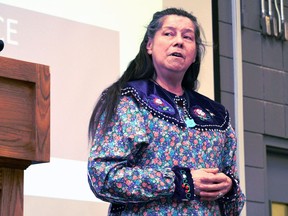As the fourth annual National Truth and Reconciliation Day approaches, an Oneida First Nation elder is highlighting the fact that while reconciliation has come a long way in recent years, there’s still a long way to go.

As the fourth annual National Truth and Reconciliation Day approaches, an Oneida First Nation elder is highlighting the fact that while reconciliation has come a long way in recent years, there’s still a long way to go.
Advertisement 2
Article content
“Reconciliation, of course, is such a subject that is unimaginable to me,” said Pasty Day, who is also a member of the Turtle Clan. “Murray Sinclair (former chair of the Truth and Reconciliation Commission) said it’s been 150 years of education and bad situations that have gotten us where we are. It is going to take another 150 years to really turn back to where we should have been.”
Day, who was taken from her mother in the 1950s and put in an orphanage, currently holds workshops in the region about the teachings of the 13 Grandmother Moons. This concept, based on the lunar calendar, provides insights into the natural world and the human spirit. By doing so, Day is hoping to spread more awareness about the positive aspects of Indigenous culture instead of the horrific history of colonialism and its impact on Indigenous people in Canada.
Advertisement 3
Article content
“We’ve been hearing so much about residential schools. It’s so well known now, and all the school children know about it now and that’s good. However, I don’t dwell on that because it is so well covered. I think that we need to look at more positive things in the culture, and that’s why I continue with the 13 Grandmother Moons,” she said.
She said she also feels a sense of duty to continue the work of those who came before her.
“My own ancestors having done work ahead of me – to bring back our status, so I could go to university, so I could have the health care that I needed – I felt a need to continue to do that,” she said.
Day will be hand for a sunrise ceremony at the Falstaff Family Centre’s Truth and Reconciliation Day events, which are being organized in conjunction with Kaswentha/Two Row Now on Sept. 30. While the day has been slightly scaled back compared to what the center has put on in past years, there will still be several events and opportunities for people to learn more about the need for the day
Advertisement 4
Article content
“There’s a couple of programs that are certainly for all ages and family experiences as well,” said Mark McCauley, a Falstaff Center spokesperson.
This includes a session with the the Aspens Ojibwe spirit horses, presented by caretakers Sallianne and Dale Patch.
While there is not a large Indigenous population, with only around 570 residents identifying as such in the most recent census, the day is intended more for other people to confront the ramifications of Canada’s colonial history, McCauley said.
“It’s day that Canadians need to acknowledge and recognize the colonial past of Canada (and the reason) for the holiday itself,” he said.
Day agreed but added that she herself doesn’t have to reconcile anything.
Advertisement 5
Article content
“It’s not us people who have to reconcile – it’s the settler population that has to reconcile something,” she said.
However, she pointed to gestures such as land acknowledgments, school announcements and efforts to learn more about Indigenous health issues as signs that work towards reconciliation is being done.
“Most of them are doing fairly well. . . . They’re doing a lot more with recognizing and acknowledging the Indigenous ways,” she said.
More information about the day and the activities planned for Truth and Reconciliation Week are available online by visiting falstafffamilycentre.com.
Article content